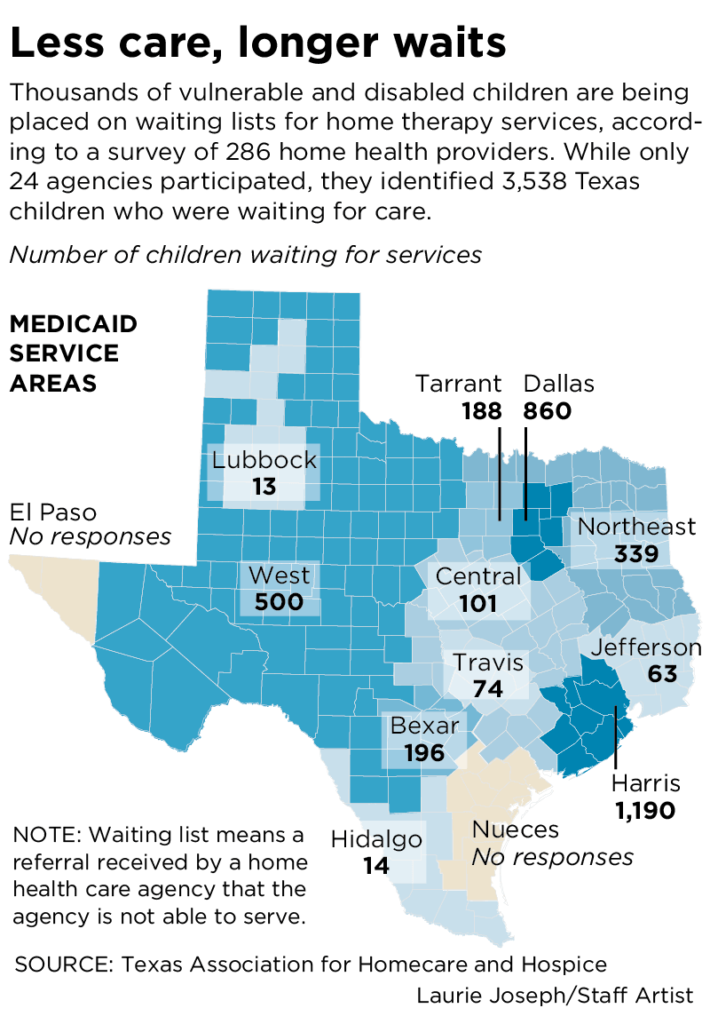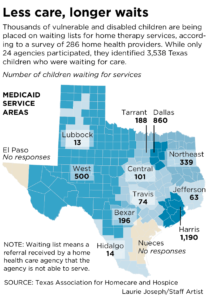Texas health officials want yet deeper pay cuts for therapists who care for poor and disabled children, a plan that directly conflicts with House members’ efforts to restore Medicaid cuts passed two years ago.
Feeling pressure from parents and advocates across Texas, House members on Thursday are considering substantial reinvestments into funding speech, physical and occupational therapies. Those services are crucial for children who, in many cases, wouldn’t otherwise be able to walk, talk or function as they grow to become adults.
Lawmakers in 2015 slashed the rates it pays for those services through Medicaid, the state-federal insurer for poor and disabled people, and spurred a protracted legal fight in which the state was ultimately allowed to move forward with the cuts that child advocates criticized as too austere.
Those cuts drove therapy providers out of Medicaid or the business altogether, industry groups say, and have disrupted care for thousands of vulnerable children who are being wait-listed for services, particularly in rural areas where therapy options are scant.
Yet despite a bipartisan effort from House leaders to fix the mess, Health and Human Services is pursuing policy tweaks that could substantially lower Medicaid payments and further suffocate a sputtering home therapy industry.
“Members, Republicans and Democrats, are really unhappy about it,” said Rep. Gene Wu, a Houston Democrat who sits on the House Appropriations Committee overseeing health and human services spending.
“The members on the Appropriations Committee essentially said you can’t be making these cuts while we’re trying to write the budget out,” Wu said. “We just don’t do it that way. But for whatever reason, they’re making rate cuts during the legislative process.”
The timing of the latest cuts is a coincidence, said Carrie Williams, a spokeswoman for the Health and Human Services Commission. Lawmakers ordered the commission to come up with $350 million in cost savings over two years, but the latest round of cuts are rolling out now because courts only recently freed the state to carry out that directive.
The commission’s new cuts include slashing Medicaid payments to therapy assistants, who often assist in translation for patients who don’t speak English, by nearly a third. The commission also wants to switch from paying by the hour to reimbursing therapists by each 15-minute increment of care they provide, a seemingly benign change that in practice could be financially ruinous for home care providers who aren’t paid for travel and administrative costs through Medicaid.
Just by cutting the pay for therapy assistants, the state expects to save at least $26 million over the next two years, Williams said. The commission is still calculating what it will save through increment billing, she said.
Priced out
The commission is essentially pricing home therapy providers out of being able to serve Medicaid patients in Texas’ far-flung counties, said Rachel Hammon, who directs the Austin-based Texas Association of Home Care and Hospice.
“Changing the payment methodology to home health therapy providers while the Legislature is actively engaged in efforts to restore funds that were cut is baffling and counterproductive,” Hammon said.
For years, therapy agencies have told health officials that fragile children are losing access to health care because of a dwindling network of providers and were instead languishing on long wait-lists, which federal Medicaid rules forbid.
Essentially, providers testified that disabled children are being referred by their doctors for speech, occupational and physical therapy, but the few groups that can provide that care are already slammed with patients and can’t help them. So those children get referred to another agency, and another, and so on.
Until recently, the commission had not measured how many Texas children are in limbo, so Hammon’s group tried to quantify the problem by surveying about 286 home health agencies. While fewer than 10 percent of those agencies responded, the group identified as many as 3,500 children who are waiting for care.
After hours of testimony about wait-lists in February, state officials began their own inquiry and polled large therapy providers.
“What we found is that the vast majority of clients who may be waiting for services are waiting because they want to see a specific provider, want a specific appointment time (such as after school), or are waiting for a physician order, physician signature or the physician’s submission of an authorization (not waiting because of a provider network gap),” Williams said in an email.
Falling through the cracks
In Vernon, a town with a population of 11,000 near the Oklahoma border, Esther Clauson says she’s been struggling for more than six months to get her autistic son three different types of therapy.
“We were falling through the cracks, and no one would do anything about it,” she said.
Before she moved to Vernon from Houston, 7-year-old Charles had been making progress in speech therapy, progressing from being able to say only one word, such as “fish” or “cup,” to nearly complete sentences.
“When he was in speech therapy, he was starting to say more: ‘Fish, please. My cup, please,” his mother said.
Clauson says when she moved to Vernon, Charles was referred to North Texas Rehab.
“They told me that there was a wait and that Medicaid was backed up,” she said.
Now he doesn’t use those words any more.
“He’s regressing,” she said,” and is making up his own language.”
These stories abound, said Tsambika Bakiris, founder of Sonrisas Therapies in Austin.
There’s much more to speech therapy than helping children ditch a speech impediment. Often, she’s helping patients understand how to swallow without choking. Recently she helped a 17-year-old fill out a job application and prepare for a job interview.
Speech therapy also is critical to helping confused children understand threats or abuse and to be able to report it when it happens.
“Individuals with a learning disorder are at a lot more risk for abuse and neglect,” Bakiris said. “They don’t understand what’s being told to them, and they can’t retell what happened.”
In El Paso, 18-year-old Joshua McKnight, who suffers from disorders including Down syndrome and deafness, has been waiting years for speech therapy, his mother says.
McKnight, who qualifies for Medicaid through a special waiver for disabled patients under the age of 21, has also been waiting eight months for an appointment with an audiologist.
“They say you’re not supposed to have to wait, but out here in El Paso, these specialists are so few and far between,” said his mother, Diane McKnight.
Jerre van den Bent, owner of Therapy 2000, a large home therapy agency in Dallas, said the state’s proposed rate scheme “will without a doubt exacerbate the access to care issues we’re seeing now.”
“It will drive more therapists out of the business,” he said.
The Health and Human Services Commission will host a hearing to review the changes at 9 a.m. April 12 in the Brown-Heatly Public Hearing Room, 4900 N. Lamar Blvd., Austin.
Published by: Dallas News
Author: J. David McSwane

